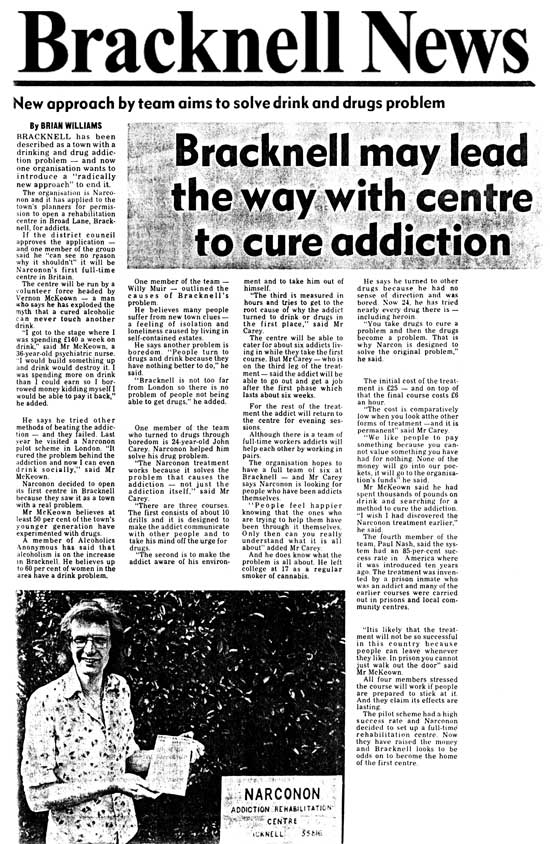New Approach by Team Aims to Solve Drink and Drugs Problem

Bracknell News (United Kingdom)
Circa 1976
by Brian Williams
BRACKNELL has been described as a town with a drinking and drug addiction problem - and now one organization wants to introduce “radically new approach” to end it.
The organisation is Narconon and it has applied to the town’s planners for permission to open a rehabilitation centre in Broad Lane, Bracknell, for addicts.
If the district council approves the application - and one member of the group said he “can see no reason why it shouldn’t”. It will be Narconon’s first full-time centre in Britain.
The centre will be run by a volunteer force headed by Vernon McKeown - a man who says he has exploded the myth that a cured alcoholic can never touch another drink.
“I got to the stage where I was spending £140 a week on drink,” said Mr. McKeown, a 36-year-old psychiatric nurse. “I would build something up and drink would destroy it. I was spending more on drink than I could earn so I borrowed money kidding myself I would be able to pay it back,” he added.
He says he tried other methods of beating the addiction - and they failed. Last year he visited a Narconon pilot scheme in London. “It cured the problem behind the addiction and now I can even drink socially,” said Mr. McKeown.
Narconon decided to open it first centre in Bracknell because they saw it as a town with a real problem.
Mr. McKeown believes at least 50 per cent of the town’s younger generation have experimented with drugs.
A member of Alcoholics Anonymous has said that alcoholism is on the increase in Bracknell. He believes up to 60 per cent of women in the area have a drink problem.
One member of the team - Willy Muir - outlined the causes of Bracknell’s problem.
He believes many people suffer from new town blues - a feeling of isolation and loneliness caused by living in self-contained estates.
He says another problem is boredom. “People turn to drugs and drink because they have nothing better to do,” he said.
“Bracknell is not too far from London so there is no problem of people not being able to get drugs,” he added.
One member of the team who turned to drugs through boredom is 24-year-old John Carey. Narconon helped him solve his drug problem.
“The Narconon treatment works because it solved the problem that causes the addiction - not just the addiction itself.” said Mr. Carey.
“There are three courses. The first consists of about 10 drills and it is designed to make the addict communicate with other people and take his mind off the urge for drugs.
“The second is to make the addict aware of his environment and take him out of himself.
“The third is measured in hours and tries to get to the root cause of why the addict turned to drink or drugs in the first place,” said Mr. Carey.
The centre will be able to cater for six addicts living in while they take the first course. But Mr. Carey - who is on the third leg of the treatment - said the addict will be able to go out and get a job after the first phase which lasts about six weeks.
For the rest of the treatment the addict will return to the centre for evening sessions.
Although there is a team of full-time workers addicts will help each other by working in pairs.
The organisation hopes to have a full team of six at Bracknell - and Mr. Carey says Narconon is looking for people who have been addicts themselves.
“People feel happier knowing that the ones who are trying to help them have been through it themselves. Only then can you really understand what all is about,” added Mr. Carey.
And he does know what the problem is all about. He left college at 17 as a regular smoker of cannabis.
He says he turned to other drugs because he had no sense of direction and was bored. Now 24, he has tried nearly every drug there is - including heroin.
“You take drugs to cure a problem and then the drugs become a problem. That is why Narconon is designed to solve the original problem,” he said.
The initial cost of the treatment is £25 - and on top of that the final course costs £6 an hour.
“The cost is comparatively low when you look at the other forms of treatment - and it is permanent” said Mr. Carey.
“We like people to pay something because you cannot value something you have had for nothing. None of the money will go into our pockets, it will go to the organisation’s funds” he said.
Mr. McKeown said he had spent thousands of pounds on drink and searching for a method to cure the addiction. “I wish I had discovered the Narconon treatment earlier,” he said.
The fourth member of the team, Paul Nash, said the system has an 85 per cent success rate in America where it was introduced ten years ago. The treatment was invented by a prison inmate who was an addict and many of the earlier courses were carried out in prisons and local community centres.
“It is likely that the treatment will not be so successful in this country because people can leave whenever they like. In prison you cannot just walk out the door” said Mr. McKeown.
All fours members stressed the course will work if people are prepared to stick at it. And they claim its effects are lasting.
The pilot scheme had a high success rate and Narconon decided to set up a full-time rehabilitation centre. Now they have raised the money and Bracknell looks to be odds on to become the home of the first centre.